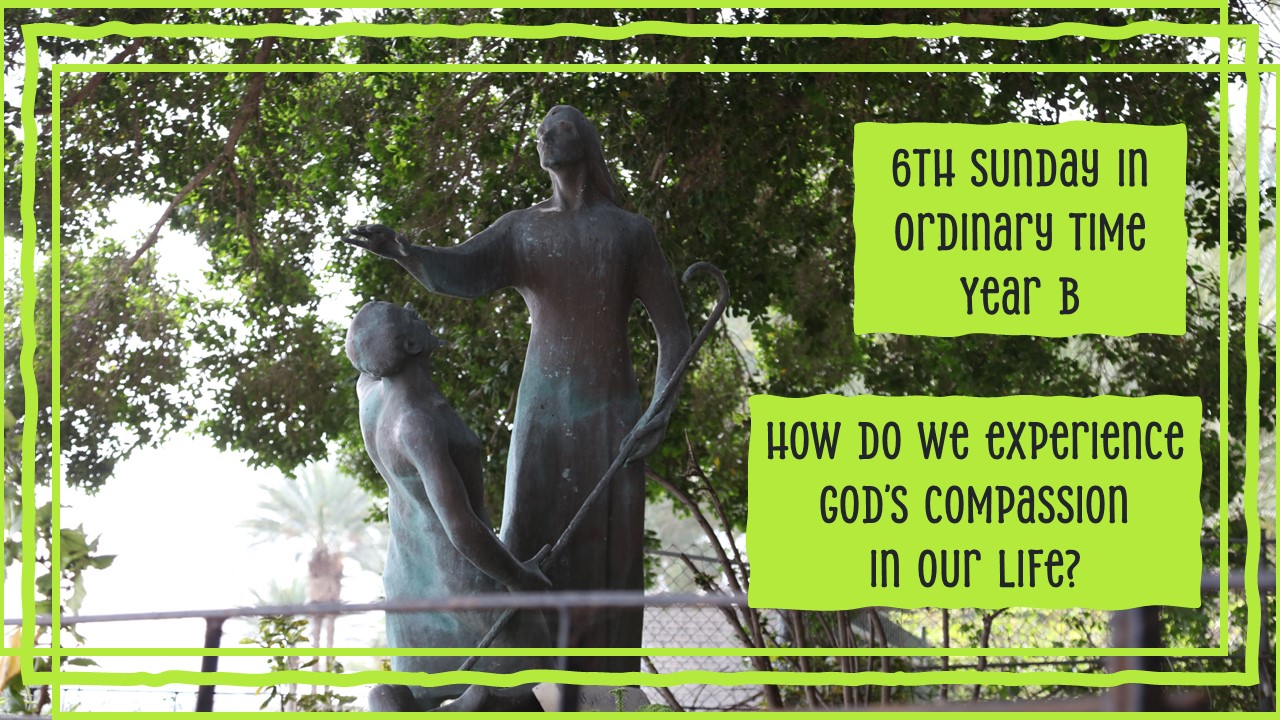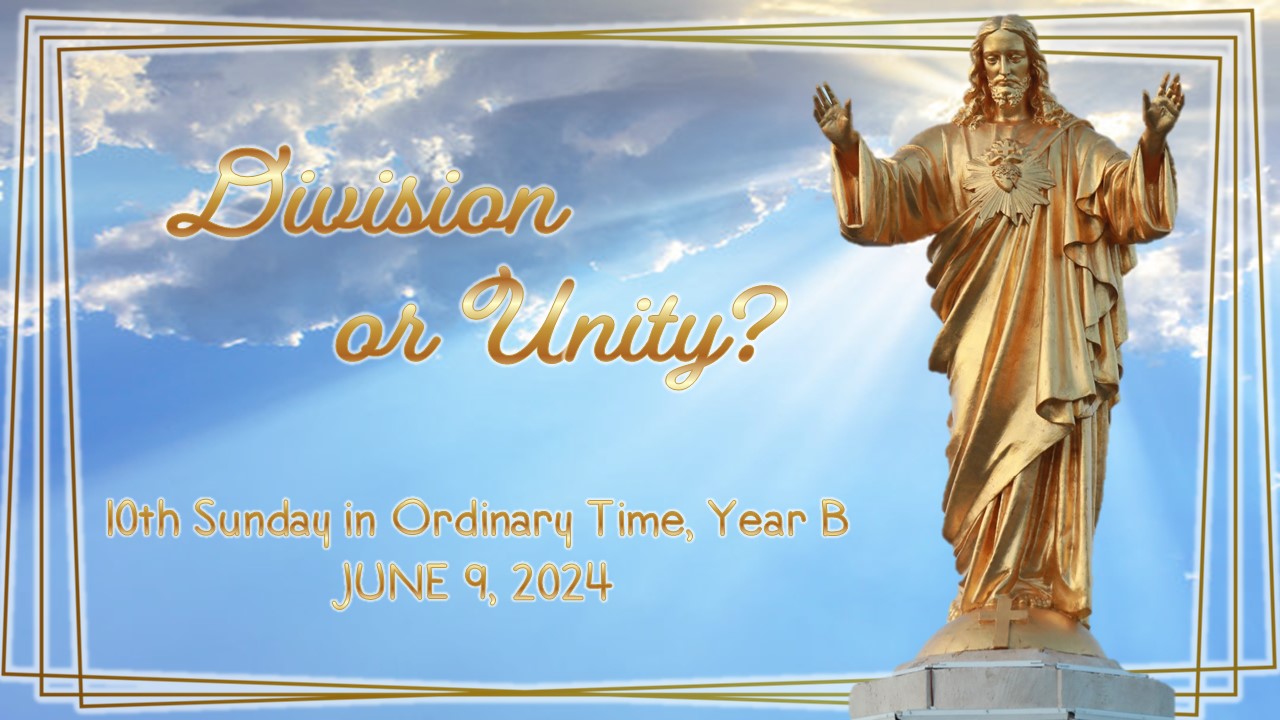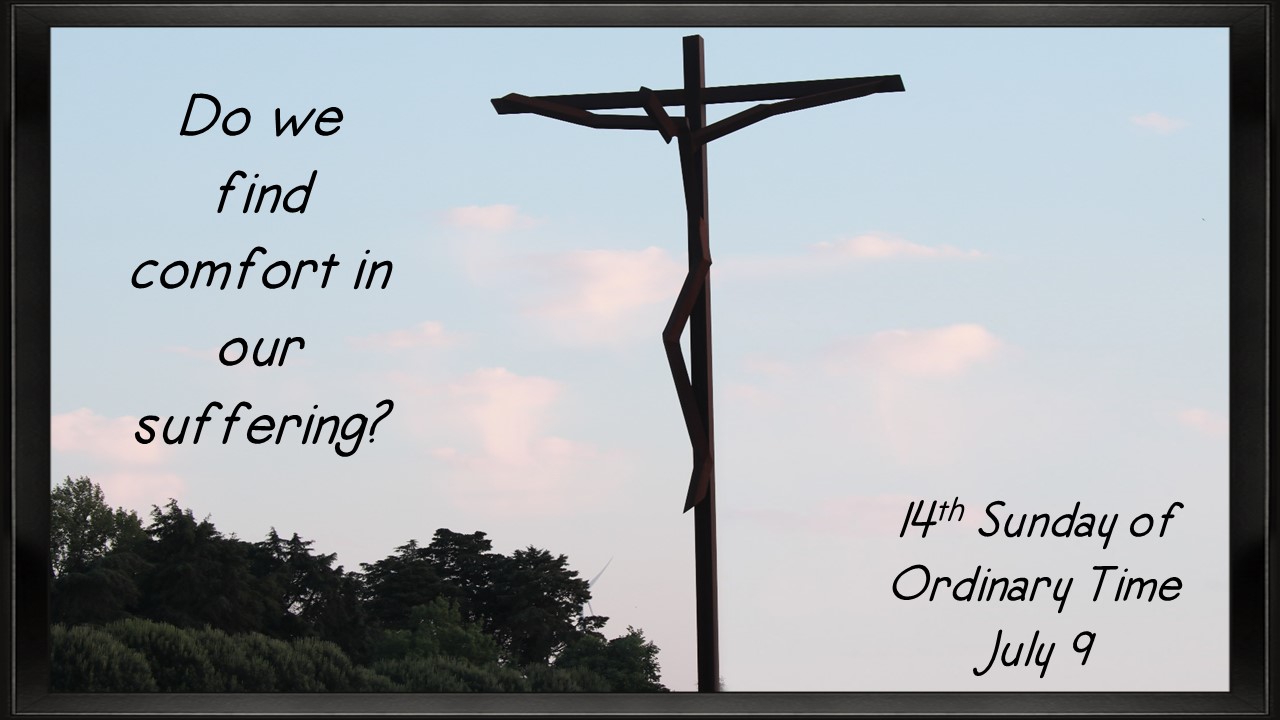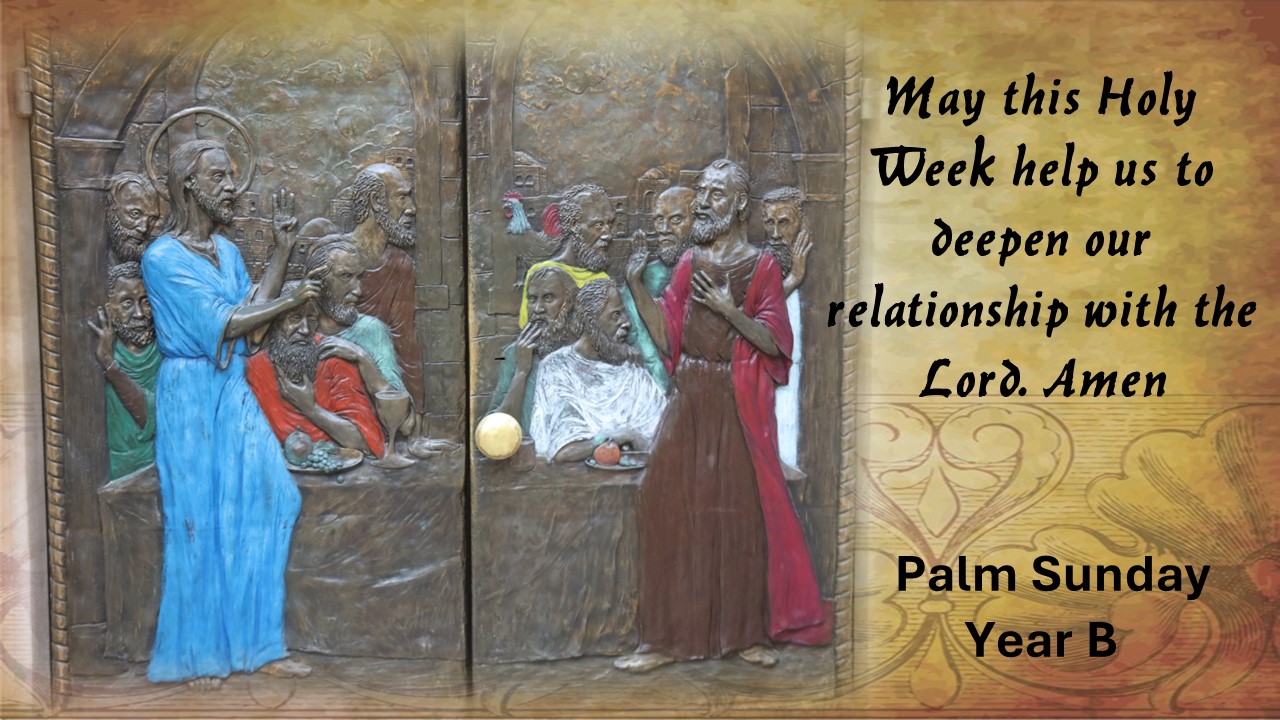
6th Sunday in Ordinary Time Year B – February 11, 2024
COMPASSIONATE GOD
God’s love, mercy and compassion is beyond our human understanding. He is everywhere looking for the lost ones because his happiness is not in the death of sinners but in repentance. The Holy Bible is full of stories about God’s compassion which keep reminding us that we need to struggle to find him.
There was a man who was always told about God; God is this, God is that. So, one day he decided to find God and see for himself what he really looked like.
He went for miles. Days became weeks and weeks became years, but he didn’t find God. Everyone he met on the way; he asked the same question. “Have you seen God, what does he look like.” Each one he met told a different story. Some said they had seen and some just ignored him calling him mad.
When years passed by and he didn’t find anything, he remembered Buddha. He remembered that Buddha met God in the Jungle. So, he decided to move towards the jungle. For weeks, he was in the forest, and one day, he found something, NO, not God, but animals.
One day, he was near a river. He met a saint. “Have you seen God, what does it look like”. The saint said, “yes, I have seen him”. “He is in the water, in the tree. wherever you look he is there.”
The man said,” what nonsense, I have heard this nonsense millions of times”. “Just tell me, have you seen him or not”.
The saint told him “Yes, I have. If you want to see him just cross the desert and on the other side, you will find him.”
The man didn’t believe him, maybe he is lying and maybe he is telling the truth. But crossing the desert is the only option left.
He started his journey. Walking for days, thirsty and hungry, he was completely exhausted. And then he found a pot under a tree. He didn’t know if it had water or not. but ran to it with all his energy. He looked inside and there was the water.
Just that moment, a bolt of lightning hit the ground and there stood a bright light in front of him. The Voice said, “You have found me, look I’m here. I am God.”
The man mad with thirst, replied, “Just a moment, please. Just a moment”. He drank the water and said, “Here is God.”
The Voice, “you made me wait for you, and then said water is your God.”
The man found God.
The man, “Yes, here is God, This water.” “You are fake, but this is true.”
The Voice said, “See, I told you at the Riverbank through the words of that saint but you didn’t agree.”
The man with tears in his eyes and smile on his face said, “This is the truth, God is in everything which gives me life. Everything that made me, everything that is helping me in my survival is God.” The man found God.
This is the last Sunday in Ordinary time before our Ash Wednesday. As we continue to meditate and reflect on the Word of God given to us everyday. Sunday, we see in the first reading the misery of the lepers. They are excluded from the community and must live outside the camp. They have to call out “unclean, unclean” while wearing torn clothes. How painful it would be for a person who is married and had young children to leave them alone and have no way to come close to them, to their other family and community members.
When the world was hit by the pandemic, people witnessed similar situations with their own family members and friends who suffered with Covid-19 and couldn’t go close to them, neither they could not come close to anyone. We saw the misery of the people. And we tried our level best to help them to stay stronger and healthy. During this time, we did experience that without God, we are nothing but when God is on our side, nothing can separate us from his love and compassion. Our human choices are different than God’s as says Prophet Isaiah (55: 5-11).
We must remember that there is difference between our choices and Divine. We humanly choose things, people, and careers based on qualification or maybe outer appearance. As we see in the First Book of Samuel, when Samuel went to anoint the new king of Israel and he was impressed by the out appearance of one of the sons of Jesse, but God reminded by saying “he sees the inside of the person but not the outer appearance. We chose to help when we have power or money in our pockets and if we are lacking both or one of them, we decline the idea of helping other people.
One rainy afternoon a mother was driving along one of the main streets of town, taking the extra precautions necessary when the roads are wet and slick. Suddenly, her son, spoke up from his relaxed position in his seat. “Mom, I’m thinking of something.”
This announcement usually meant he had been pondering some fact for a while and was now ready to expound all that his six-year-old mind had discovered. She was eager to hear.
“What are you thinking?” she asked.
“The rain!;” he began, “is like sin, and the windshield wipers are like God wiping our sins away.”
After the chill bumps raced up her arms, I was able to respond. “That’s really good, son.”
Then her curiosity broke in. How far would this little boy take this revelation? So, she asked… “Do you notice how the rain keeps on coming? What does that tell you?”
The son didn’t hesitate one moment with his answer: “We keep on sinning, and God just keeps on forgiving us.”
Today’s Sacred Scripture Readings are showing us the same message. In the First Reading we come to know about the instructions regarding the lepers and what they were supposed to do. How painful it would be for those people to leave everyone in the family and live outside in a deserted place. Not only that but also, they must cry out to everyone “Unclean, Unclean” which would bring more pain to them.
In the Gospel we could see and feel the pain, depression, and stress of the leper as he begs Jesus by saying “if you choose, you can make me clean”. These words of the leper are open invitation to all of us to invite Jesus in our lives for healing and strength. Jesus is our healer and Saviour who has carried all our infirmities and iniquities on to him and died for us on the cross to save us. The choice of the leper was to come to Jesus rather than going somewhere else. What is ours?
Amid the leper’s pain and distress, comes the divine compassion as Jesus says “I do choose. Be made clean!” Wow that’s amazing divine compassion for all of us. Throughout the history of our salvation, God has chosen right and best things for us. First, he created us on his own image then gave authority over everything he created. Secondly, he chose people to be his and he be the God for them. To strengthen and affirm this bound of love he kept sending holy people to keep bringing people back to him. He kept forgiving people’s sin and transgressions, slow to anger and bounding in steadfast love. He does not count our sins because he can not deny himself as St. Paul says. Thirdly God loved the world so much that he gave his only Begotten Son that any who believes in him, may have life and life in abundance. There is endless list of God’s choices for us because God is so loving and caring because “it is not we who have chosen him, but it is he who has chosen us to be his loving children.”
So, as we prepare ourselves to begin the new liturgical season of Lent, what are the choices we are going to make? Are we going to allow Jesus to choose for us what is best or are we going to choose what is good for us based on our human wisdom, understanding, knowledge and qualification?
Once upon a time there was a wealthy and rich king. He was known for his flawless administration and ruled the hearts of his subjects. People would come to him carrying their problems, with high hopes and he would never send them back disheartened.
Time passed, years flew by, and the king started to become old and frail. He began to worry about who would take care of his kingdom after his death. The question of who would be the heir for his chair started to loom his mind.
The king was blessed with three sons, who were loyal obedient and respectful towards the king. But he wanted all three of them to go through a test to prove themselves and to see who had the real caliber and who was fit to be a king.
He called his three sons and gave them 100 gold coins each. Time of one year would be given to all of them to use these 100 gold coins. Then he said,” whoever brings a golden dog for me shall be my successor”. The three sons set out with their own set of gold coins.
The eldest of three brothers went to the city and took a palace on rent for himself. Then he hired some men, and sent them in all four directions, with the order to find the golden dog. After a few weeks, these men returned empty handed. In all of this process, his 100 gold coins got used. The eldest son lost the fight for the throne then and there.
The second son became a broker in the town and started lending money to people on lower interests. He earned multiple profits through this business and with the money he had of profits, he gave the local goldsmith the order to make a Golden dog.
The youngest of all three was the wisest. He bought a small house for himself and started staying in a colony of poor and needy people. He invested his money in a business and reaped heavy profits from it and thereby employed a few poor people under him. He not only provided employment to the poor but also built hospitals and schools for the poor from that money, to help them lead a better life. Seeing his contribution for them, the poor people around him were very happy and started treating him God-like. Satisfied with his work he went back to his father.
A year passed by and the three sons stood in front of the king. The eldest gave nothing; the second son gave a golden dog. The turn of the third son came. He said, “His Highness please accept this dog made of cotton. I ask you in all humility, not to underestimate the special appeal of this dog. I have crafted it with my own hands. The hard work, toil under the hot sun to grow this cotton and the labor put in by my fellow companions is nothing less of gold.” The King chose him to his heir after him.
Holy Father Pope Francis says “Compassion leads Jesus to concrete action: he reinstates the marginalized! These are the three key concepts that the Church proposes in today’s liturgy of the word: the compassion of Jesus in the face of marginalization and his desire to reinstate. Jesus revolutionizes and upsets that fearful, narrow and prejudiced mentality. He does not abolish the law of Moses, but rather brings it to fulfilment. He does so by stating, for example, that the law of retaliation is counterproductive, that God is not pleased by a Sabbath observance which demeans or condemns a man. He does so by refusing to condemn the sinful woman but saves her from the blind zeal of those prepared to stone her ruthlessly in the belief that they were applying the law of Moses. Jesus also revolutionizes consciences in the Sermon on the Mount, opening new horizons for humanity and fully revealing God’s love. The logic of love, based not on fear but on freedom and charity, on healthy zeal and the saving will of God. For “God our Saviour desires everyone to be saved and to come to the knowledge of the truth”. “I desire mercy and not sacrifice”.
Jesus, the new Moses, wanted to heal the leper. He wanted to touch him and restore him to the community without being “hemmed in” by prejudice, conformity to the prevailing mindset or worry about becoming infected. Jesus responds immediately to the leper’s plea, without waiting to study the situation and all its possible consequences! For Jesus, what matters above all is reaching out to save those far off, healing the wounds of the sick, restoring everyone to God’s family!
The Church’s way, from the time of the Council of Jerusalem, has always been the way of Jesus, the way of mercy and reinstatement. The way of the Church is not to condemn anyone for eternity; to pour out the balm of God’s mercy on all those who ask for it with a sincere heart. The way of the Church is precisely to leave her four walls behind and to go out in search of those who are distant, those essentially on the “outskirts” of life. It is to adopt fully God’s own approach, to follow the Master who said: “Those who are well have no need of the physician, but those who are sick; I have come to call, not the righteous but sinners” (Lk 5:31-32).
St. Francis de Sales says “Do not fear what may happen tomorrow. The same loving Father who cares for you today will care for you tomorrow and every day. Either He will shield you from suffering, or He will give you unfailing strength to bear it. Be at peace, then, and put aside all anxious thoughts and imaginings.”
How do we experience God’s compassion in our life?
Other Sermons In This Series

10th Sunday in Ordinary Time, Year B ~ JUNE 9, 2024
June 07, 2024

14th Sunday in Ordinary Time Year A ~ July 9, 2023
July 07, 2023

Palm Sunday – Year B ~ March 24, 2024
March 22, 2024

